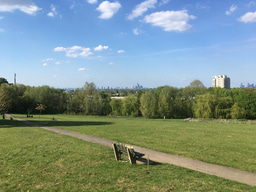Share your stories on coronavirus
Published in Astronomy

COVID-19 is having an extraordinary impact across every aspect of our daily lives. I have never seen supermarkets totally devoid of items, my partner was furloughed at the start of April, and my mother, in her 70s and a recent transplant patient, is extremely vulnerable.
It's now over 3 months since I began working from home. The nature of my job means that I was able to transition from office to home working with limited disruption, and there's been no shortage of work to be getting on with. I am so grateful for this as I know that for many people working from home is difficult or basically impossible.
How's it been for you?
Are you able to run a research group and teach remotely? How accessible are labs and equipment? Are other academic duties taking priority at the moment? How do you think COVID-19 will change the research landscape as we move forward?
We encourage you to share your stories with the Community, including tips and advice, challenges and frustrations, progress and accomplishments.
We’d love to hear from you during this time, but the most important thing is keep healthy, stay connected and look after yourself, friends and family.
Posted as the UK lowers its COVID-19 alert level to Level 3 (epidemic is in general circulation).
Poster image: a clear view of the London skyline from a park in South London on a sunny day, free of pollution.


Please sign in or register for FREE
If you are a registered user on Research Communities by Springer Nature, please sign in
Dear Ruth,
Thank you for the time and enthusiasm that you invested in this post. I found the quarantine time in Mexico could be used for the good of science.
I started working remotely from home since early March and keeping quarantine and social distancing. Epidemic curves are showing an exponential growth in Mexico these days. The American continent is the new epicenter for the pandemia. Stay at home advise is not taken seriously by many, but those of us who love reading and learning are enjoying it somehow, please allow me to elaborate.
It hasn't been difficult for me to cope with the situation, with time to spare I am working remotely and have a small lab at home to continue my work, I decided to start assembling some research work on high altitude scientific ballooning. I am integrating a small program to build remote sensing platforms to measure UV and ionizing radiation conditions at altitudes of 40km, into the stratosphere, where regular latex weather balloons can easily reach. I have managed to build a flight follow up network of engineering and science students throughout the central part of Mexico to receive and decode the platform telemetry using dedicated software, rooftop mounted circular polarized antennas and software defined radios operating on UHF frequencies.
I will soon be returning to an idle project with the Mexican metrology institute for precision time GPS common view based atomic clock synchronization. I luckily keep a UTC Rubidium clock time scale at home for this.
I have been running photometric observations (before rainy season starts) of the variability of several Delta Scuti stars with small aperture instruments.
I also spend time on a daily basis doing physical sciences outreach to the Mexican society through social media, which have served me well since 2013 when the idea came to my mind. This has been a wonderful time to write, to share more and at the same time, involve others in astrophysics and the passion of gathering scientific knowledge.
The Covid-19 virus is here to stay. Our new normality will have to cope with remote working and enhancing the remote collaboration experience in all of our science activities. This is normal in many ways for us scientists who usually work online with our peers (both local and abroad), but for those who still work on a face to face correspondence, things will have to evolve a little bit.
Thank you for the time and space to correspond with you and the Nature community. It is a pleasure forming part of it. Stay safe!
MSc. Edgardo Molina
Laboratorio de Ciencias Fisicas
Mexico City, Mexico.